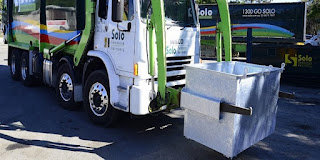Hazardous Waste Disposal and Industrial Bin Services to Meet the Specific Demands of Industries and Businesses in Adelaide
Companies and businesses in
Adelaide and nearby regions produce a variety of hazardous waste types as part
of their operations. Strict regulations govern the storage, treatment, and
disposal of hazardous waste, which cannot be simply discarded like household
waste due to its high potential to contaminate the environment, cause injury,
and harm people's and wildlife's health. Chemical process industries (CPI),
medical facilities, and metal manufacturing units all generate large amounts of
hazardous waste.
Hazardous waste that cannot
be destroyed or treated must be properly disposed of. New waste piles are
carefully built over an impervious base that must meet regulatory standards.
Only non-containerised solid waste and non-flowing waste can be stored in new
piles, that must also be protected from wind dispersal or erosion. Two
impermeable liners and leachate collection systems are required for a secure
hazardous waste landfill. The landfill's bottom and the underlying bedrock or
groundwater table must be at least 10 feet apart.
Chemical,
thermal, biological and physical methods to treat hazardous waste
The Adelaide Waste and
Recycling Centre's hazardous waste disposal Adelaide services treat hazardous waste using chemical, thermal,
biological, and physical methods. The company uses thermal methods such as
high-temperature incinerators, which not only detoxify but also destroy certain
organic waste. Hazardous waste with an intrinsic heat of combustion is
frequently incinerated by its hazardous waste disposal Adelaide service in
furnaces, rotary kilns, or other suitable combustion equipment. The company's
hazardous waste disposal in Adelaide uses specialised thermal equipment to burn
solid, liquid, and sludge, such as fluidised-bed incinerators, liquid-injection
incinerators, and multiple-hearth furnaces.
Hazardous waste disposal
Adelaide services use the biological treatment method to treat hazardous waste
biologically. On a suitable plot of land, the waste is carefully mixed with
surface soil and microbes are added. In some cases, genetically modified bacteria
are used to stabilise hazardous waste on previously contaminated sites.
Evaporation, sedimentation, floatation, and filtration are some of the physical
processes used in the treatment of hazardous waste disposal in Adelaide. In
some cases, the encapsulation method can be used to create a solid mass of
material that is resistant to leaching.
Industrial
bin services for safer facilities
Industrial bins contribute
to the creation of cleaner and safer facilities. These reduce clutter at the
industrial facility, which can lower employee productivity significantly,
while also keeping everyone safe by allowing hazardous industrial waste to be
safely placed in it for removal, treatment, and disposal by a professional
industrial services.
Industrial bin service is
critical for waste storage and transportation. Heavy-duty industrial bins can
store thousands of pounds of waste at once. The manufacturing units use the
company's industrial bin services to
scrap metal from the premises and store unusable materials and discarded waste.
To meet the needs of
businesses, the company's industrial bin service offers bins of various sizes.
Some of the bin sizes provided by the company’s industrial bin services are:
·
1 cubic meter
·
1.5 cubic meter
·
2 cubic meter
·
3 cubic meter
·
4.5 cubic meter
·
1100 liter bin
·
Large multi-fit type bins
The casters and roll-off
functionality of the company's industrial bins make them easy to move and
maneuver. The company's industrial bin services include galvanised bins that
are rust-resistant and can be provided with or without wheels. The bins
are colour-coded to match the waste management program or colour scheme of the
site.
More
waste management and recycling solutions
Adelaide Waste and Recycling
Centre also offers tyre disposal, green waste disposal, and cardboard
recycling. Green waste is composted to create nutrient-rich manure that can be
used to grow plants. The company's cardboard recycling service ensures that all
paper and cardboard that arrives at its recycling facility is properly
recycled. This reduces the need to cut down trees to obtain paper and cardboard
for packaging. Adelaide Waste and Recycling thus contributes to environmental
preservation. Recycled paper and cardboard can be used to package items.
The Adelaide rubbish tip is
a busy transfer station where commercial and domestic vehicles come to dispose
of their waste. Because of the transportation efficiencies used by its truck
operators, the bulk hauling of waste from the Adelaide transfer station has a
positive impact on the environment, with lower carbon emissions.
Adelaide Waste and Recycling
Centre accepts a wide range of commercial and domestic waste types for
recycling, including general waste, construction and demolition (C&D)
waste, green waste, clean oil, mattresses, paint, and more. All households and
small businesses in the region can recycle their computers and televisions for
free at its North Plympton recycling facility. The site is part of the National
Television and Computer Recycling Scheme.



.jpg)
Comments
Post a Comment